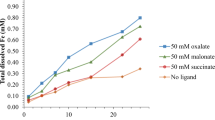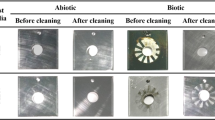Abstract
THE stimulation of iron corrosion under anaerobic conditions by Vibrio desulfuricans is well known, and the organism has recently been shown1 to be a facultative autotroph. Several laboratory investigations of this type of corrosion have been described2–4. But, to our knowledge, there has, as yet, been no published comparison of the corrosion under heterotrophic and under autotrophic conditions. We have felt that such a comparison should throw further light on the mechanism of this type of corrosion and on the explanation first proposed by von Wolzogen Kuhr2. This worker considered that the stimulation of corrosion was due to the utilization by the bacteria of cathodically produced hydrogen, by which the corrosion reaction would otherwise be polarized.
This is a preview of subscription content, access via your institution
Access options
Subscribe to this journal
Receive 51 print issues and online access
$199.00 per year
only $3.90 per issue
Buy this article
- Purchase on Springer Link
- Instant access to full article PDF
Prices may be subject to local taxes which are calculated during checkout
Similar content being viewed by others
References
Nature, 160, 154 (1947).
Water, 18, 147 (1934).
J. Soc. Chem. Indust., 58, 93 (1939).
“Chemistry Research”, 22 (H.M. Stationery Office, London, 1948).
Author information
Authors and Affiliations
Rights and permissions
About this article
Cite this article
SPRUIT, C., WANKLYN, J. Iron/Sulphide Ratios in Corrosion by Sulphate-reducing Bacteria. Nature 168, 951–952 (1951). https://doi.org/10.1038/168951a0
Issue Date:
DOI: https://doi.org/10.1038/168951a0
This article is cited by
Comments
By submitting a comment you agree to abide by our Terms and Community Guidelines. If you find something abusive or that does not comply with our terms or guidelines please flag it as inappropriate.



